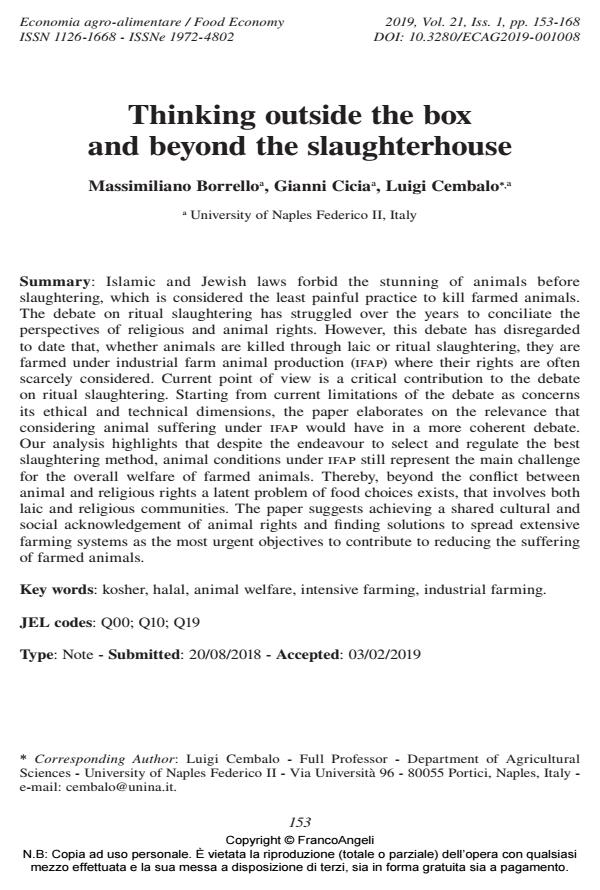Thinking outside the box and beyond the slaughterhouse
Titolo Rivista ECONOMIA AGRO-ALIMENTARE
Autori/Curatori Massimiliano Borrello, Gianni Cicia, Luigi Cembalo
Anno di pubblicazione 2019 Fascicolo 2019/1
Lingua Inglese Numero pagine 15 P. 153-167 Dimensione file 120 KB
DOI 10.3280/ECAG2019-001008
Il DOI è il codice a barre della proprietà intellettuale: per saperne di più
clicca qui
Qui sotto puoi vedere in anteprima la prima pagina di questo articolo.
Se questo articolo ti interessa, lo puoi acquistare (e scaricare in formato pdf) seguendo le facili indicazioni per acquistare il download credit. Acquista Download Credits per scaricare questo Articolo in formato PDF

FrancoAngeli è membro della Publishers International Linking Association, Inc (PILA), associazione indipendente e non profit per facilitare (attraverso i servizi tecnologici implementati da CrossRef.org) l’accesso degli studiosi ai contenuti digitali nelle pubblicazioni professionali e scientifiche.
Islamic and Jewish laws forbid the stunning of animals before slaughtering, which is considered the least painful practice to kill farmed animals. The debate on ritual slaughtering has struggled over the years to conciliate the perspectives of religious and animal rights. However, this debate has disregarded to date that, whether animals are killed through laic or ritual slaughtering, they are farmed under industrial farm animal production (ifap) where their rights are often scarcely considered. Current point of view is a critical contribution to the debate on ritual slaughtering. Starting from current limitations of the debate as concerns its ethical and technical dimensions, the paper elaborates on the relevance that considering animal suffering under ifap would have in a more coherent debate. Our analysis highlights that despite the endeavour to select and regulate the best slaughtering method, animal conditions under ifap still represent the main challenge for the overall welfare of farmed animals. Thereby, beyond the conflict between animal and religious rights a latent problem of food choices exists, that involves both laic and religious communities. The paper suggests achieving a shared cultural and social acknowledgement of animal rights and finding solutions to spread extensive farming systems as the most urgent objectives to contribute to reducing the suffering of farmed animals.
Parole chiave:kosher, halal, animal welfare, intensive farming, industrial farming.
Jel codes:Q00; Q10; Q19
Massimiliano Borrello, Gianni Cicia, Luigi Cembalo, Thinking outside the box and beyond the slaughterhouse in "ECONOMIA AGRO-ALIMENTARE" 1/2019, pp 153-167, DOI: 10.3280/ECAG2019-001008